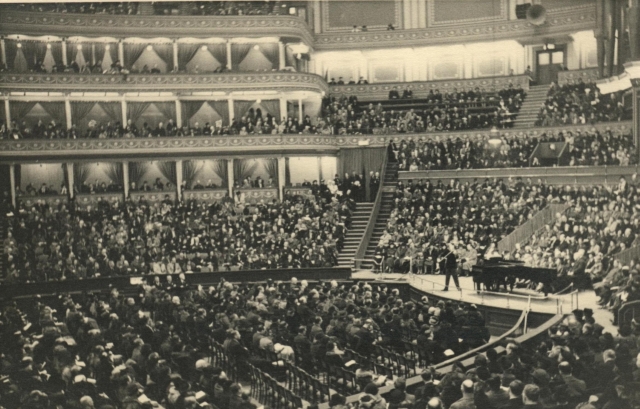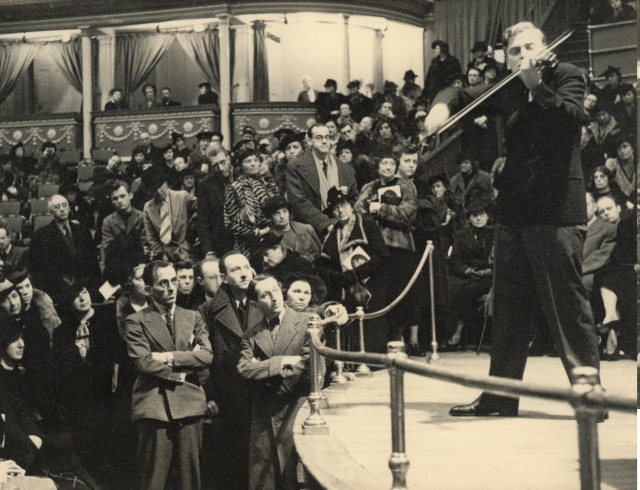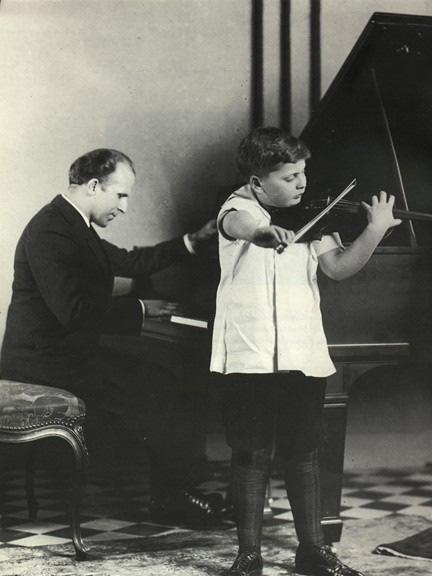Overture
Royal Albert Hall, London, Sunday 21 March, 1938
After being kept waiting for violinist Yehudi Menuhin to begin a matinée recital, sections of the huge audience become impatient. Foot stamping and slow clapping break out. Backstage, Yehudi's father and manager, Moshe, and his British concert agent, Harold Holt, are locked in frantic discussion. The pianist, Ferguson Webster, has a problem; on the way to the hall earlier, he had left his music on the bus. Efforts to trace the missing scores have failed.
Yehudi is unfazed by the crisis and is content to dispense with the accompaniment altogether. He will play solo Bach all afternoon if required. But the patrons have paid to hear particular works, and Yehudi is receiving an enormous fee to perform them. If demands for refunds are to be avoided, Moshe and Holt know that an attempt will have to be made to complete at least most of the published programme. Braving the restless fans, Holt makes an announcement explaining the reason for the delay. He asks the audience for help; would anyone provide Webster with scores they may have brought with them to study during the performance? A student sitting high in the gallery throws down to the stage his copy of Tartini's Devil's Trill Sonata - the opening work. This lone response proves to be generous; had he paused before offering up his score, the student might have claimed a rich reward. Holt now offers £5 notes (the equivalent of £200 today) for those willing to take a taxi home and bring back music for pieces by Brahms, Joachim, Locatelli, Rossini, and Paganini. A few accept the money and dash off. Forty minutes late, the musicians start into the Tartini Sonata.

1. Yehudi Menuhin and Ferguson Webster during their delayed Albert Hall recital.
Next, Yehudi plays the unaccompanied Bach Chaconne. There then being no sign of the taxi volunteers, the interval is brought forward. Yehudi keeps hoping that nobody returns with their scores. Some do not, but his plan to give the remainder of the recital alone with Bach is thwarted by the arrival of the more-honourable among the volunteers, including one carrying the score of Lalo's Concerto in F, centrepiece of the second half. Yehudi fills the remaining gaps with solo Bach and the recital is concluded largely as advertised. Instead of refunds, the audience demands a series of encores. Yehudi obliges - with yet more Bach.

2. Yehudi plays another solo Bach encore
Seated in the middle of the three boxes in the photo above are figures bearing resemblance to members of the Gould family. In the centre, and watching Yehudi closely, would be Diana Gould flanked by her mother, Evelyn, and her sister, Griselda. The bearded gentleman at the rear has the appearance of a naval officer, Diana's stepfather, Cecil Harcourt, perhaps. Ever since his triumphant London debut back in 1929, the Goulds had been hoping that Yehudi would visit Mulberry House, their mansion in Chelsea, where Evelyn, a former concert pianist held court for visiting musical celebrities. But Yehudi had ignored a previous invitation. It would be another six years before he invited himself to Mulberry House for a lunch of wartime rations that instantly altered the course of his life - and Diana's. Elsewhere in the audience are two Australians who do not have to wait so long for an introduction to Yehudi or for their lives to alter course abruptly. After the encores, they are led down to the dressing rooms where they watch Yehudi dealing patiently with the crush of admirers. As Lindsay Nicholas and his sister are eventually introduced, Yehudi is much taken with the auburn-haired Nola. At the age of almost twenty-two, he is looking for a way to escape the confines of his cosseted upbringing. He is also feeling the urge to fall in love and promptly does so.
Discovering that the two families are staying at the same hotel, Yehudi - chaperoned by his mother and his two sisters - spends the rest of the evening in the Nicholases' suite. Hephzibah, equally determined on independence as was her brother, falls for Lindsay. There follows a breathless nine weeks of romance at the end of which Yehudi marries Nola, and Lindsay accepts Hephzibah's proposal that they too should wed. Between these hastily arranged nuptials, the sixteen-year-old Yaltah is shunted off to marry a man she did not love.
***************************
Yehudi admitted that the things he most wanted he usually got. Sometime in the weeks leading up to his fourth birthday he was taken to a symphony concert at San Francisco's Curran Theatre. Perched on Moshe's knee, the infant looked down from the cheap gallery seats to the musicians below. He later described feeling as though he was observing the scene through the wrong end of a telescope. His gaze came to rest on the figure of Louis Persinger, the orchestra's leader, who happened on that occasion to be performing as the soloist in a violin concerto. The boy could not contain his excitement. In much the same way as a child might wish to become a fireman or an engine driver, he decided there and then what he most wanted to be. Turning to his father and pointing in the direction of the stage, Yehudi asked if he could have a violin for his birthday and be taught by Persinger how to play it. To his impoverished parents, the first request was beyond their means, the second laughable.
On the day of his birthday, 22 April 1920, Moshe and Marutha took their son for a picnic celebration. A family friend arrived with a present. Yehudi unwrapped the gift, but his disappointment was intense. The metal violin was cold to the touch and would not respond to the boy's first attempt to make it sing. To the astonishment and embarrassment of the adult observers, he threw the toy to the ground in a fury and stamped on it.
Writing to her mother in Palestine, Marutha described Yehudi's violent reaction. His grandmother sent a money order with the wish that a real violin be purchased and that he be given lessons. In spite of their son's persistence, Moshe and Marutha were in no hurry to spend the funds in the way the donor intended; Yehudi did not begin lessons until one year after the destruction of the tinny fake. Although continuing to insist that Persinger be his teacher, Yehudi had to make do with a less-favoured alternative for two years during which time he established a reputation as a local prodigy sufficient finally to persuade Persinger to grant the boy his wish. He would not be the last distinguished musician to succumb to Yehudi's seemingly miraculous gifts.
After two years of tuition with Persinger and shortly before his ninth birthday, Yehudi launched his professional career on 30 March 1925 with a full-length recital in the Scottish Rite Auditorium, San Francisco. Persinger was the accompanist. The audience sat in wonderment. On the way home after the final ovation he was treated to a strawberry ice cream soda. As the Menuhin children went to sleep in a tent-like arrangement erected in the rear garden, the critics preparing copy for the morning papers were juggling superlatives. The recital had been a technical and artistic triumph but there was something more, an element that defied explanation.
This was not simply exceptional talent: it was genius.

3. Persinger and Yehudi pose for a publicity shot, San Francisco, circa 1925.